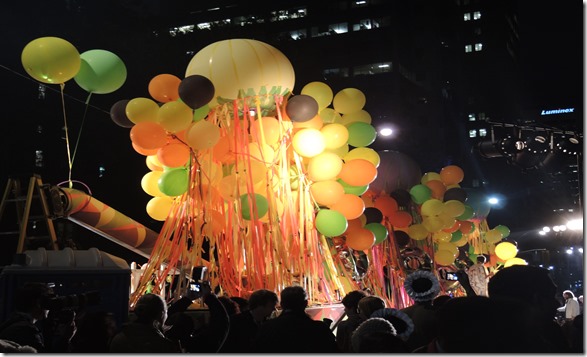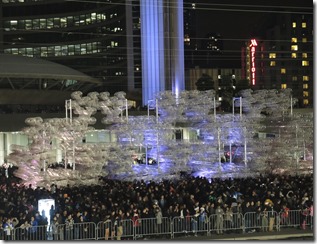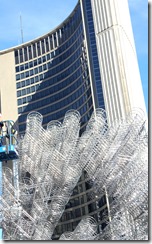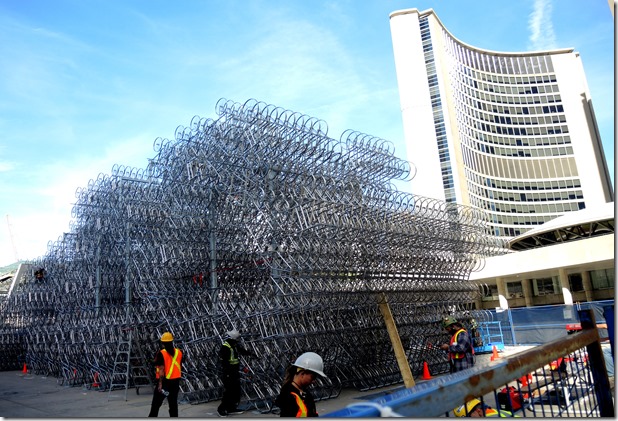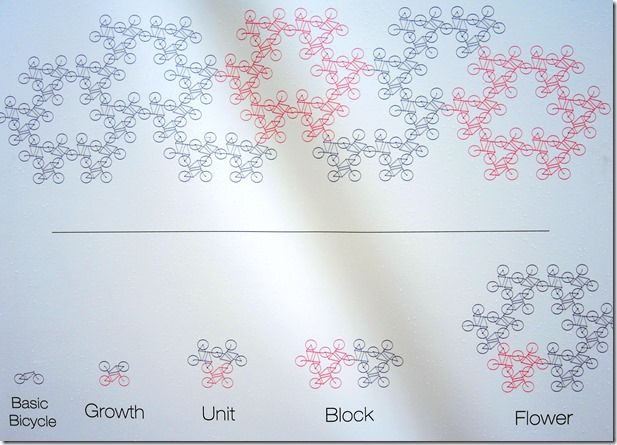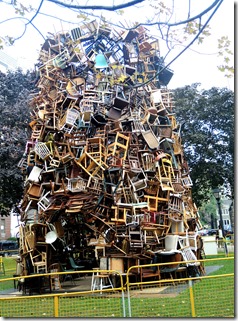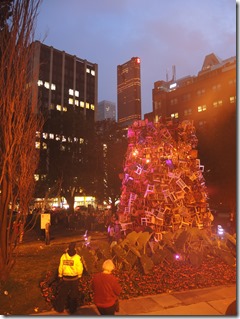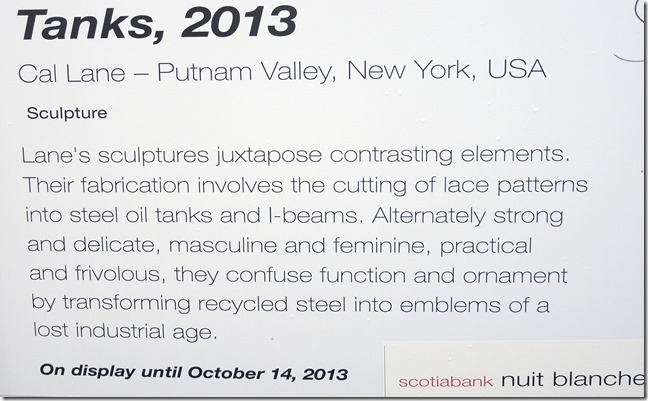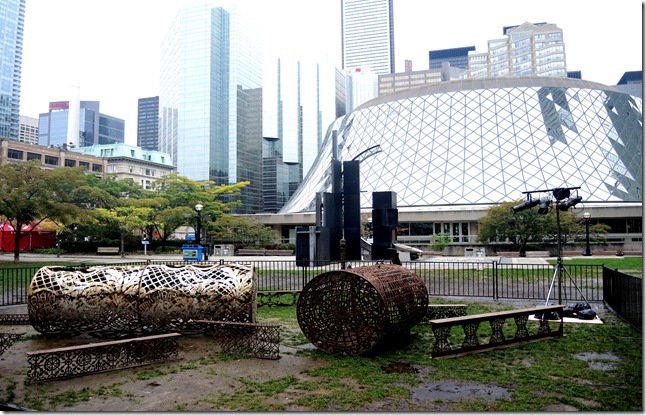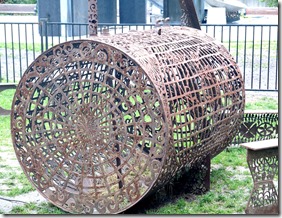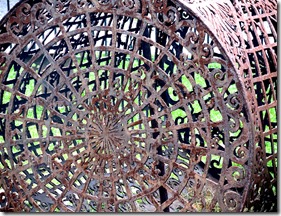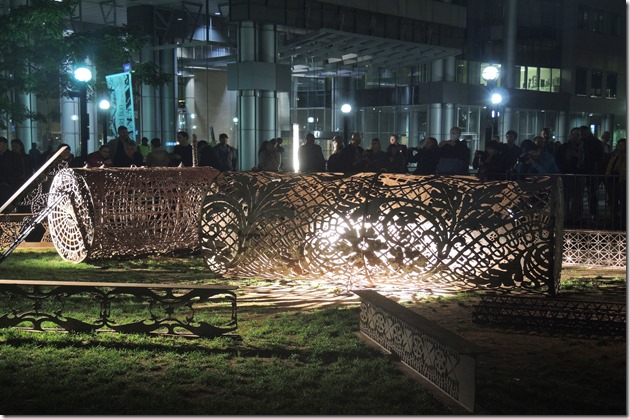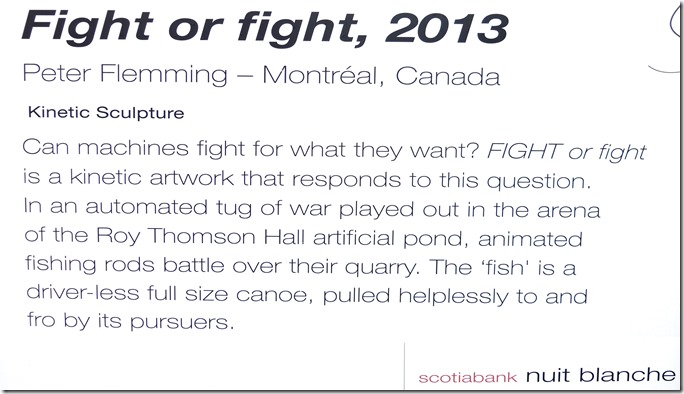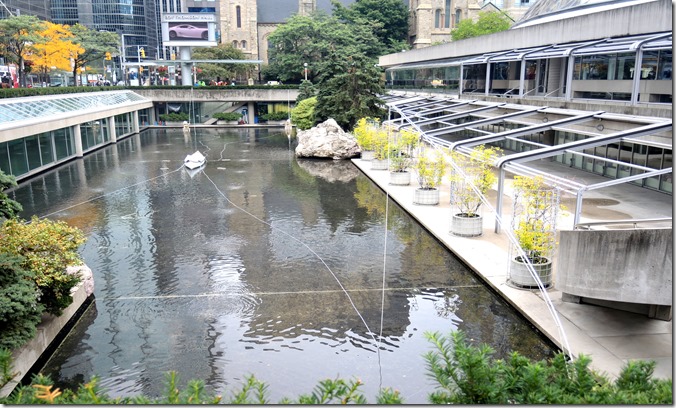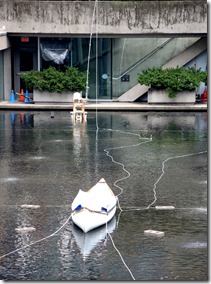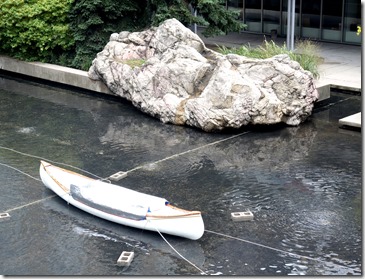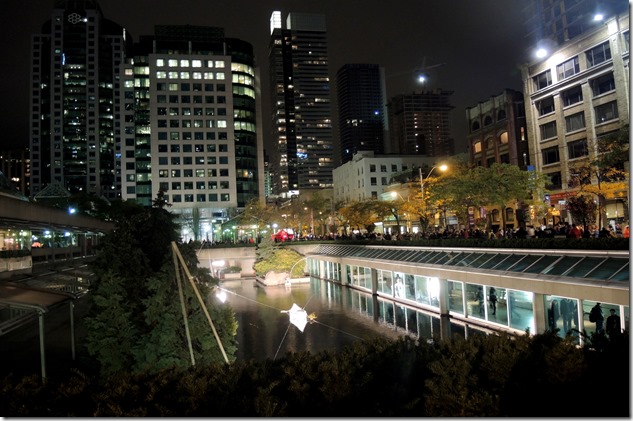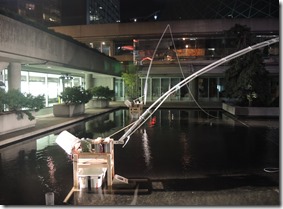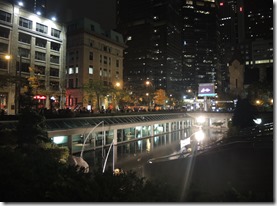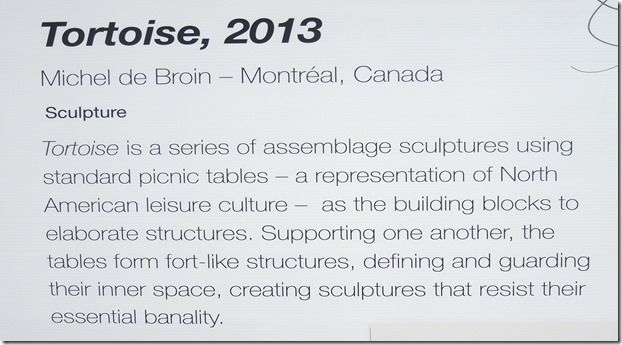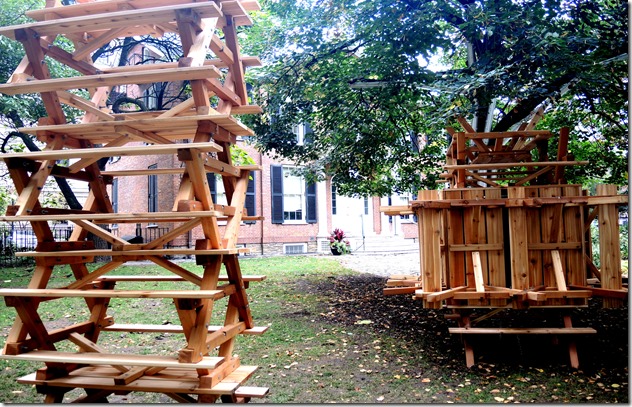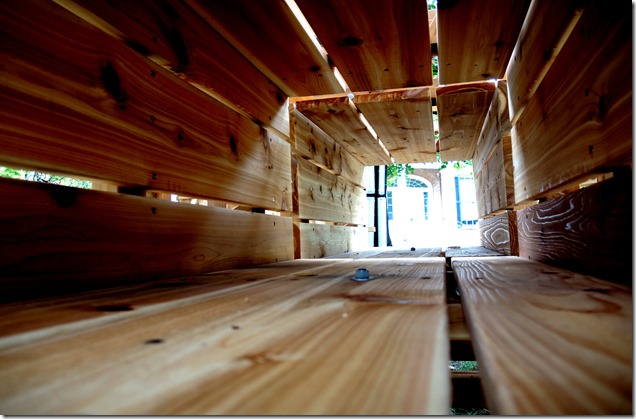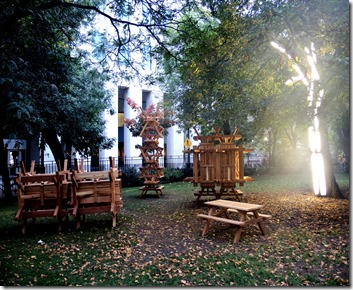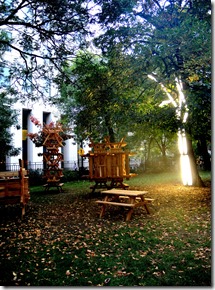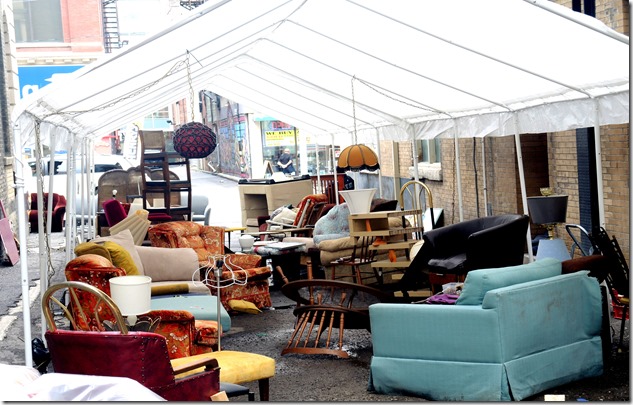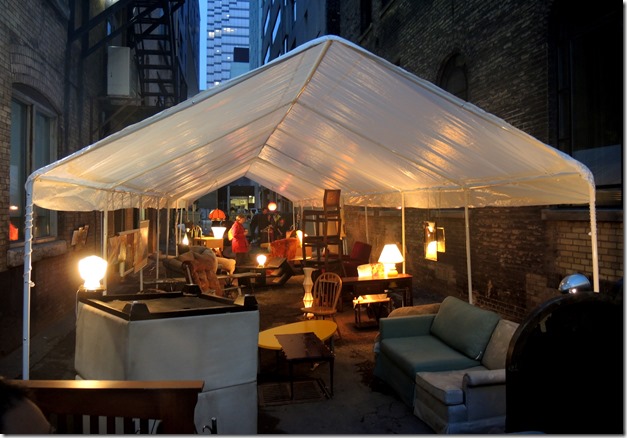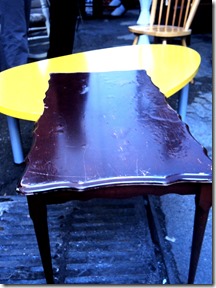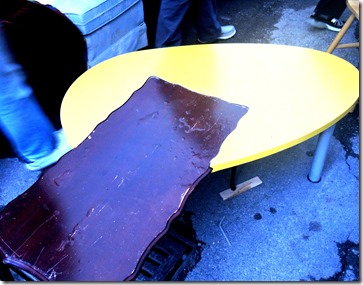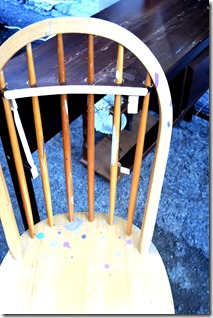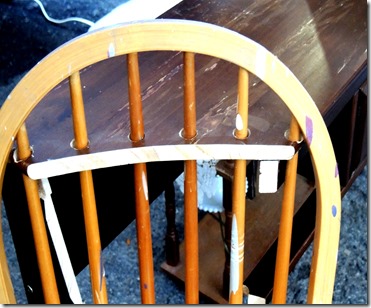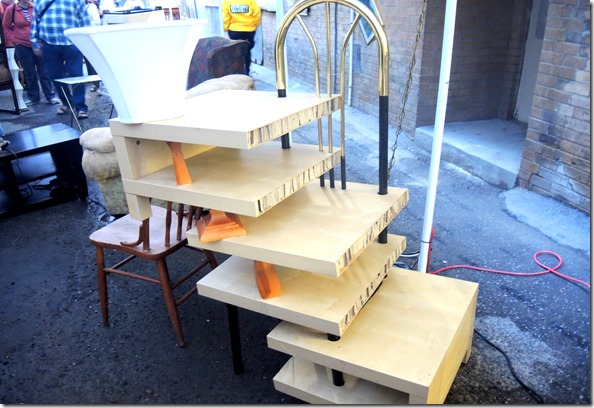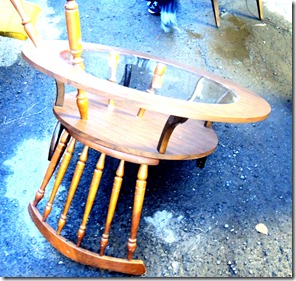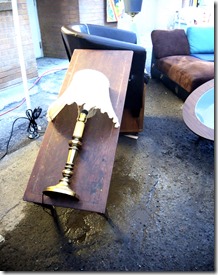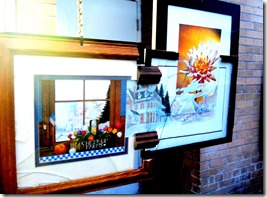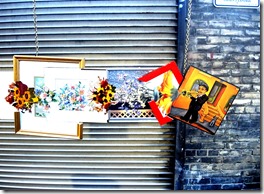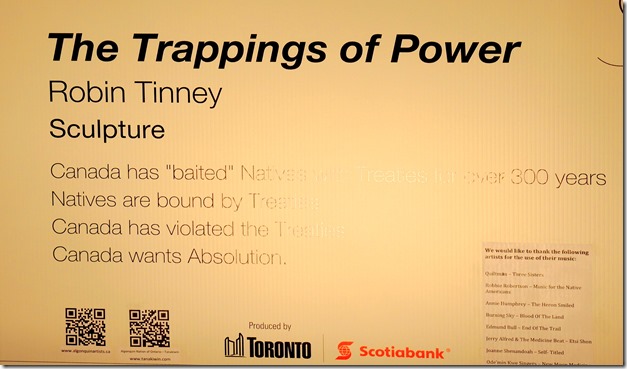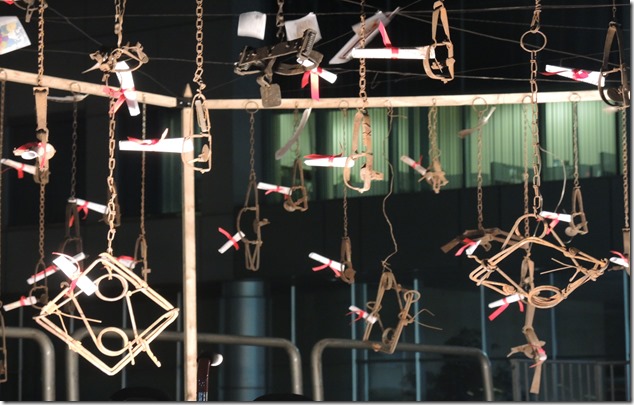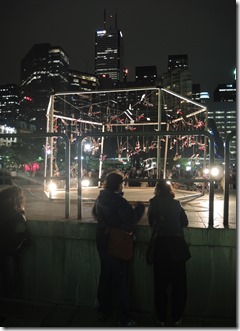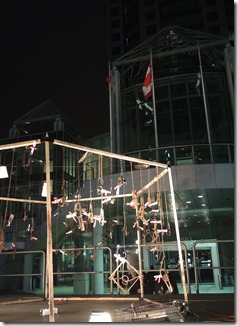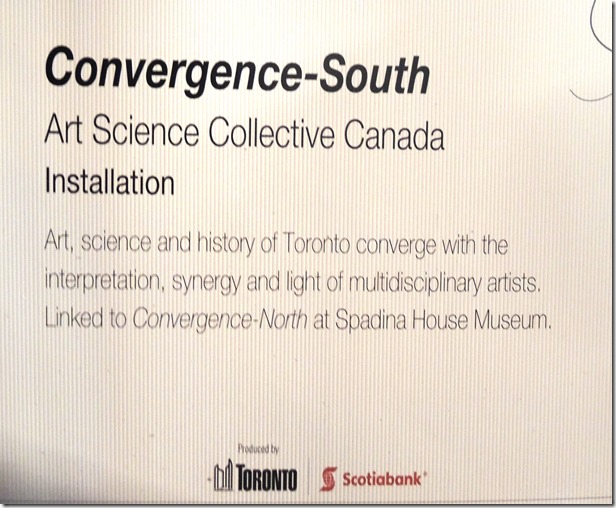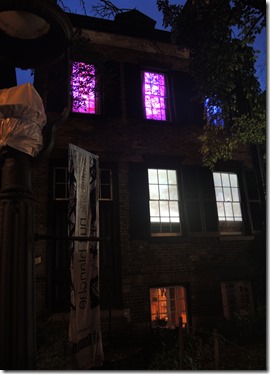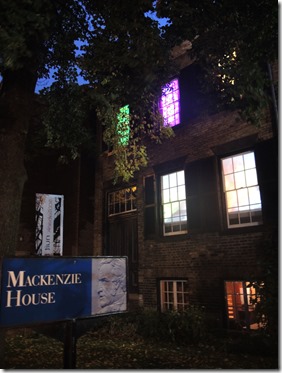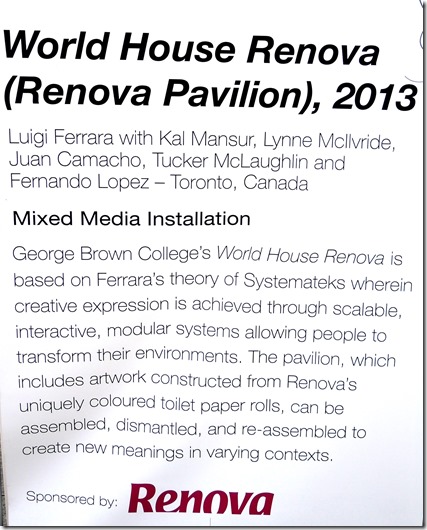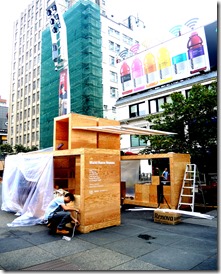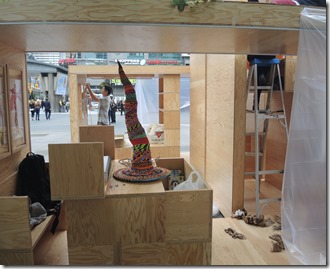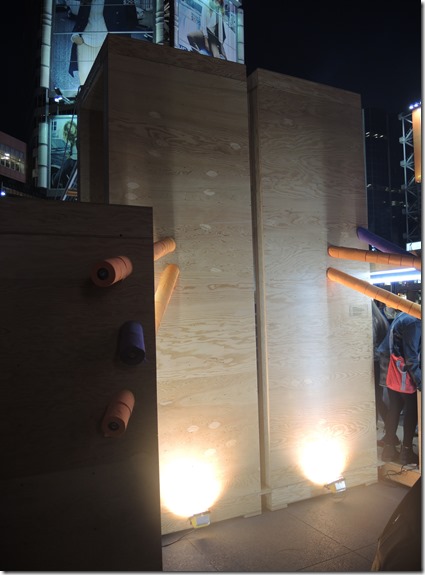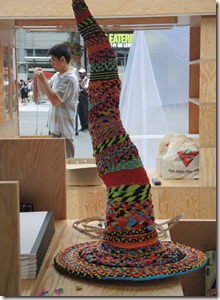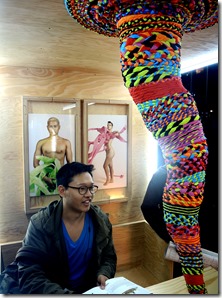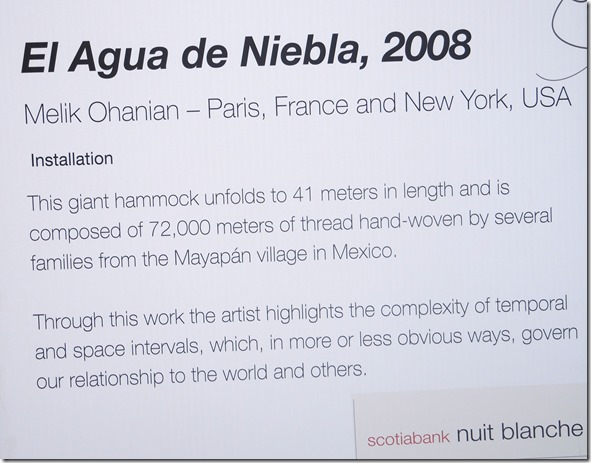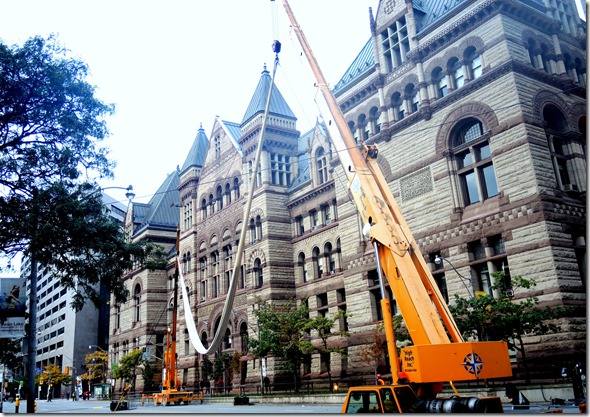Nuit Blanche—a festive of visual and interactive art that rivaled the colour and animation of a Santa Claus or Grey Cup Parade. To facilitate the event, the east lanes of University Avenue were closed from Queen West to Bloor streets. The art installations were placed on large flatbed trucks, such as those employed for parade floats. This section of the festival was appropriately entitled “Parade.” Sections of Bay Street and also King Street West were also closed to traffic to create space for the enormous crowds to wander and enjoy the sights. Last year, over a million people attended the event.
The above photos are of Ai Weiwei’s “Bicycles Forever,” which garnered the most attention. It was located in Nathan Phillips Square in front of the City Hall, and was composed of 3144 aluminum bicycles.
The shape of the sculpture appeared different, depending on where you are standing. Below is a diagram explaining the structure of the design.
On Saturday October 5, in the morning, I departed early to photograph the various art installations for “Nuit Blanche—2013.” My plan was to photograph them as they were being assembled, hoping to gain an understanding of how they would appear when completed. Several of the offerings had been assembled in advance, notably “Bicycles Forever” and “Garden Tower of Toronto, 2013.” However, many artists were unable to do this. I was amazed to discover that in the midst of their work, they took the time to explain their creations.
This sculpture, composed of stacked chairs, is entitled “Garden Tower in Toronto, 2013.” It was created by Tadashi Kawamata from Hokkaido, Japan. It was assembled the week prior to Niut Blanche, allowing plenty of time to photograph it. However, on the evening of Niut Blanche, it was amazing how it was transformed by the floodlights. Participants were able to walk inside the tower and gaze upward for an entirely different view.
Below are some of the other displays of visual arts, many of them having sound and music to accompany them.I photographed them during the day on Saturday October 5th, and then again after nightfall, during Nuit Blanche.
This display was at David Pecaut Square on King Street West. The street was closed for the occasion, from University Avenue to Peter Street.
“Fight or fight” was on the reflecting pond on the north side of the Roy Thomson Hall. The canoe on the pond was attached to four large fishing poles, and after dark, the fishing poles swayed and bent as they struggled to land the canoe, as a fisherman would with his/her pole.
The “Tortoise” was on the lawn of Campbell House, at University and Queen Street West.
This creative endeavour was the combined effort of six young talented artists. It was in a narrow laneway near Queen East and Church Streets. I was so impressed with this display that I was tempted to create an entire post on it. You entered the display between carefully arranged garbage dumpsters, and were confronted by a living room scene that would have made “Sanford and Son” feel at home. In case you do not remember that TV sit-come, it was a show about a garbage collector. However, the furniture in “Take a Load Off” was certainly not garbage. It had been rearranged, deconstructed, and combined to create pieces of art that were interesting, amusing, and at times inspiring. Viewers were invited to sit on the furniture, at their own risk, which was minimal. This was the display where I had the most fun of the entire evening.
This was the scene in the late afternoon, before the display was ready to be viewed. At first glance, it simply appeared to be a random collection of used furniture.
After dark, the display became charming, but it still resembled a furniture showroom for second-hand store. However, the pieces were now carefully placed to allow the viewer to wander through and examine the collection. Entering, I was amazed at what the artists had accomplished.
Two coffee tables, sculpted into a single piece.
A chair that has been inserted into a coffee table.
A kitchen chair, a set of tables, and legs that have been combined with a metal stand.
A glass-topped coffee tables combined with a chair (left), and half of a lamp inserted into a coffee table (right).
Integrated pictures on the walls of the alleyway.
“Trappings of Power” was displayed in David Pecaut Square. Due to the glare, it is difficult to view the entire sign. I believe it reads: “Canada has baited Natives with treaties for over 300 years. Natives are bound by the treaties . . .Canada has violated the treaties. . . Canada wants Absolution.
In the background are the lights of Metro Hall on King West.
This installation was at Mackenzie House on Bond Street, south of Dundas East. The house was the home of Toronto’s first mayor, William Lyon Mackenzie. The windows of the house were employed as movie screens for Nuit Blanche and showed scenes of the city.
The Renova Pavilion was in Dundas Square
This was Saturday afternoon, while the display was under construction.
What appeared to be a witches hat (left) in the afternoon, actually represented a tornado. It was composed of tightly rolled coloured toilet paper.
The huge hammock was at Bay and Queen streets, on the west side of the Old City Hall. Bay Street was closed to traffic from Queen to Dundas.
Nuit Blanche—Amazing!
To view the post about Nuit Blanche 2013, examining the art installations on University Avenue, entitled, “Parade.”
https://tayloronhistory.com/2013/10/08/afterglow-of-nuit-blance-2013parade/
To view the Home Page for this blog: https://tayloronhistory.com/
To view other posts about the history of Toronto and its buildings:
The Arts and Letters Club, the former St. George’s Hall at 14 Elm Street.
The Ellis Building on Adelaide Street near Spadina Ave.
The Heintzman Building on Yonge Street, next to the Elgin Theatre
The tall narrow building at 242 Yonge Street, south of Dundas
https://tayloronhistory.com/2013/07/10/torontos-architectural-gems242-yonge-st-south-of-dundas/
Toronto’s first Reference Library at College and St. George Streets.
The Commodore Building at 315-317 Adelaide St. West
The Graphic Arts Building (condo) on Richmond Street
The Art Deco Victory Building on Richmond Street
The Concourse Building on Adelaide Street
The old Bank of Commerce at 197 Yonge Street
The Traders Bank on Yonge Street—the city’s second skyscraper
https://tayloronhistory.com/2013/05/22/torontos-architectural-gemstraders-bank-on-yonge-st/
Toronto’s old Union Station on Front Street, built in 1884
https://tayloronhistory.com/2013/05/18/torontos-lost-architectural-gemsthe-old-union-station/
St. Andrew’s Presbyterian Church at King and Simcoe Streets.
https://tayloronhistory.com/2013/05/13/torontos-architectural-gemshistoric-st-andrews-on-king-st/
The row houses on Glasgow Street, near Spadina and College Streets
https://tayloronhistory.com/2013/05/10/torontos-architectural-gemsrow-houses-on-glasgow-st/
The bank at Queen and Simcoe that resembles a Greek temple
The cenotaph at Toronto’s Old City Hall
https://tayloronhistory.com/2013/04/09/torontos-architectural-gemscenotaph-at-old-city-hall/
The magnificent Metropolitan Cathedral at King East and Church Streets
https://tayloronhistory.com/2013/04/02/torontos-architectural-gemsmetropolitan-cathedral/
St. Stanislaus Koska RC Church on Denison Avenue, north of Queen West
The historical St. Mary’s Church at Adelaide and Bathurst Streets
The Bishop’s (St, Michael’s) Palace on Church Street, Toronto
https://tayloronhistory.com/2013/03/02/torontos-architectural-gemsbishops-palace-on-church-street/
The Union Building at Simcoe and King Street West
https://tayloronhistory.com/2013/03/30/torontos-architectural-gemsthe-union-building-on-king-st/
The Ed Mirvish (Pantages, Imperial, Canon) Theatre, a true architectural gem on Toronto’s Yonge Street
The Waverly Hotel on Spadina near College Street.
https://tayloronhistory.com/2013/02/16/toronto-architectural-gemsthe-waverly-hotel-484-spadina/
The Art Deco Bank of Commerce building on King Street West.
The Postal Delivery Building, now the Air Canada Centre (ACC)
The Bellevue Fire Station on College Street
https://tayloronhistory.com/2013/02/14/torontos-architectural-gems-bellevue-fire-station/
The Bank of Nova Scotia at King and Bay Streets
Toronto’s old Sunnyside Beach
https://tayloronhistory.com/2013/02/01/a-pictorial-journey-to-sunnyside-beach-of-old-part-one/
https://tayloronhistory.com/2013/02/03/a-pictorial-journey-to-torontos-old-sunnyside-beach-part-two/
Toronto’s architectural gems—the Runnymede Library
https://tayloronhistory.com/2013/02/05/torontos-architectural-gems-runnymede-library/
Spadina Avenue – sinful, spicy and diverse
https://tayloronhistory.com/2012/09/28/sinfully-saucy-and-diversetorontos-spadina-avenue/
The Reading Building, a warehouse loft on Spadina Avenue
https://tayloronhistory.com/2013/01/20/torontos-architectural-gemsthe-reading-building-on-spadina/
The Darling Building on Spadina Avenue
https://tayloronhistory.com/2013/01/19/torontos-architectural-gemsthe-darling-building-on-spadina/
The amazing Fashion Building on Spadina Avenue
Toronto’s architectural gems – the Tower Building at Spadina and Adelaide Street
The Balfour Building at 119 Spadina Avenue
The Robertson Building at 215 Spadina that houses the Dark Horse Espresso Bar
An architectural gem – Grossman’s Tavern at Spadina and Cecil Streets
https://tayloronhistory.com/2012/11/08/architectural-gem-grossmans-tavern-at-377-9-spadina/Historic
History of the house that contains the Paul Magder Fur Shop at 202 Spadina
An important historic building that disappeared from the northeast corner of Spadina and College
Historic bank building on northeast corner of Spadina and Queen West
https://tayloronhistory.com/2012/12/02/torontos-architectural-gemsbank-at-spadina-and-queen-west/
History of the Backpackers’ Hotel at King and Spadina
https://tayloronhistory.com/2012/03/31/history-of-the-backpackers-hotel-at-king-and-spadina/
Hamburger corner – Spadina and Queen Streets
https://tayloronhistory.com/2012/10/10/torontos-hamburger-cornerwhere-is-it-and-why/
Lord Lansdowne Public School on Spadina Crescent
The Victory Burlesque Theatre at Dundas and Spadina
https://tayloronhistory.com/2012/09/08/the-sinful-victory-burlesque-theatre-at-dundas-and-spadina/
The Dragon City Mall on the southwest corner of Dundas and Spadina
https://tayloronhistory.com/2012/08/25/torontos-heritage-the-southwest-corner-of-queen-and-spadina/
Buildings on the west side of Spadina a short distance north of Queen Street.
History of the site of the Mcdonalds on northwest corner of Queen and Spadina
https://tayloronhistory.com/2012/08/27/mcdonalds-at-queen-and-spadina-on-an-historic-site/
A former mansion at 235 Spadina that is now almost hidden from view.
ttps://tayloronhistory.wordpress.com/2012/07/04/torontos-architectural-gems-is-this-one-a-joke/
Military hero of the War of 1812 lived near corner of Spadina and Queen West.
The Art Deco bus terminal at Bay and Dundas Streets.
Photos of the surroundings of the CN Tower and and the St. Lawrence Market in 1977
The old Dominion Bank Building at King and Yonge Street
The Canada Life Building on University and Queen Street West.
Campbell House at the corner of Queen Street West and University Avenue
A study of Osgoode Hall
https://tayloronhistory.com/2012/04/12/enjoying-torontos-architectural-gems-osgoode-hall/
Toronto’s first City Hall, now a part of the St. Lawrence Market
Toronto’s Draper Street, a time-tunnel into the 19th century
The Black Bull Tavern at Queen and Soho Streets, established in 1822
History of the 1867 fence around Osgoode Hall on Queen Street West at York Street
Gathering around the radio as a child in the 1940s
The opening of the University Theatre on Bloor Street, west of Bay St.
https://tayloronhistory.com/2012/02/24/the-opening-of-torontos-university-theatre-on-bloor-street/
122 persons perish in the Noronic Disaster on Toronto’s waterfront in 1949
Historic Victoria Memorial Square where Toronto’s first cemetery was located, now hidden amid the Entertainment District
https://tayloronhistory.com/2012/01/09/victoria-square-in-torontos-entertainment-district-is-a-gem/
Visiting one of Toronto’s best preserved 19th-century streets-Willcocks Avenue
The 1930s Water Maintenance Building on Brant Street, north of St. Andrew’s Park
Toronto’s architectural gems-photos of the Old City from a book published by the city in 1912
Toronto’s architectural gems in 1912
https://tayloronhistory.com/2012/12/04/torontos-architectural-gems-in-1912/
Toronto’s architectural gems – the bank on the northeast corner of Queen West and Spadina
https://tayloronhistory.com/2012/12/02/torontos-architectural-gemsbank-at-spadina-and-queen-west/
Photos of the surroundings of the CN Tower and and the St. Lawrence Market in 1977
The St. Lawrence Hall on King Street
https://tayloronhistory.com/2012/04/28/enjoying-torontos-architectural-gems-the-st-lawrence-hall/
Toronto’s streetcars through the past decades
https://tayloronhistory.com/2012/03/26/memories-of-torontos-streetcars-of-yesteryear/
History of Trinity Bellwoods Park
https://tayloronhistory.com/2012/04/09/the-history-and-beauty-of-trinity-bellwood-park/
A history of Toronto’s famous ferry boats to the Toronto Islands
